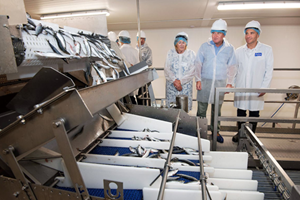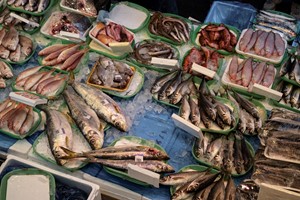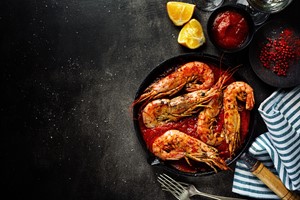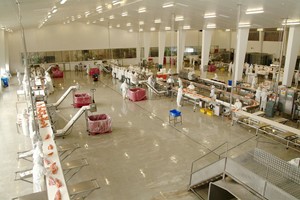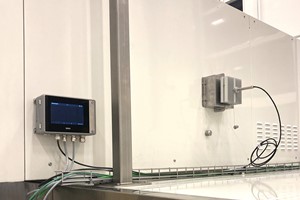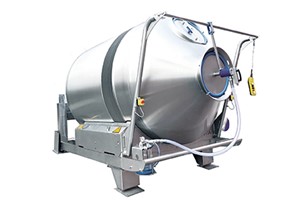SeafoodSource is actively tracking the latest innovations in seafood processing and equipment, providing regular updates on significant developments in the industry.
Canada’s Department of Fisheries and Oceans (DFO) has committed CAD 225 million (USD 163 million, EUR 150 million) to enhance small craft harbors along the country’s Atlantic coast. The investment breakdown includes CAD 50 million (USD 36 million, EUR 33 million) allocated for harbors in the Gaspé Peninsula of Quebec, CAD 74 million (USD 53 million, EUR 49 million) for harbors in Nova Scotia, and CAD 101 million (USD 73 million, EUR 67 million) for harbors and search and rescue capacity in Newfoundland and Labrador.
Diane Lebouthillier, Canada’s Minister of Fisheries, Oceans, and the Canadian Coast Guard, emphasized that small craft harbors are vital to the nation's fishing communities. Lebouthillier highlighted the importance of these investments, not just for economic development, but also for ensuring food security. She pointed out that the 2024 Budget
reflects the government’s commitment to providing fish harvesters with modern, climate-resilient harbors that will benefit future generations.
The investments, which span three years, will address critical infrastructure needs, such as repairing the main breakwater at the Rivière-au-Renard wharf in Quebec, which was severely damaged during a winter storm in December 2022. Additionally, the funding will cover repairs at five Nova Scotia harbors that were damaged by Hurricane Fiona—Cape John, Ingonish (Macleods Point), Judique (Baxters Cove), Little Judique Ponds, and New Waterford—as well as 10 harbors in Newfoundland that also sustained damage from the hurricane.
In the UK, Morrisons’ food manufacturing supplier, Myton Food Group, has inaugurated the largest fish-freezing center in the country. The new Falfish Freezing Centre, located in Cornwall, England, was developed by Myton’s subsidiary Falfish at a cost of GBP 12.8 million (USD 16.3 million, EUR 14.9 million). This state-of-the-art facility can freeze 112,000 fish per hour, a milestone that strengthens Morrisons’ position as one of Britain’s leading food producers. Myton Food Group Managing Director, Andrew Thornber, emphasized the significance of this investment, noting that over 80 percent of the fish and shellfish sold in Morrisons stores are sourced from their seafood operations in Cornwall. The facility also bolsters Morrisons’ seafood export business.
In Spain, trout farmer Piszolla, owned by Aqualande, has partnered with Ace Aquatec to install the Humane Stunner Universal, a fish-stunning solution that represents Ace Aquatec’s first venture into the Spanish market. The stunner, installed at Piszolla’s trout farm in Alba de Tormes, Salamanca, aims to reduce fish stress during harvesting and promote more humane practices. Julio Hernandez, Regional Manager at Piszolla, expressed that this installation would enhance operational efficiency and set new standards for animal welfare in Spain, supporting the production of high-quality, sustainable seafood products.
Packaging company ProAmpac has launched a new recyclable food tray, the Proactive Recyclable Fresh Tray FT-1000, designed to meet the sustainability needs of foodservice and grocery markets. The tray, made from polypropylene and classified as Plastic #5, is approved for curbside recycling. Pascal Labrie, Vice President and General Manager of ProAmpac’s tray business, highlighted the tray’s robustness and its alignment with sustainability goals. The FT-1000, composed of 90 percent air to reduce material usage, is a more sustainable alternative to conventional packaging, offering durability, water, and grease resistance, and maintaining performance on wrapping equipment.
Landcatch, a brand of Hendrix Genetics focused on salmon breeding, has earned the right to label salmon fed with insect-based protein as “Label Rouge,” a prestigious French quality
label. The endorsement results from collaboration between Landcatch, Scottish Quality Salmon, and insect feed producer Protix, marking a significant milestone in sustainable aquaculture practices. Label Rouge is a widely recognized standard in the Scottish salmon industry and plays a key role in its marketing strategy in Europe.
UVAXX and A*STAR Infectious Diseases Labs have successfully developed a vaccine to combat Scale Drop Disease Virus (SDDV) in Barramundi, a significant breakthrough for the aquaculture industry. This novel epitope-based vaccine, supported by the Singapore Food Agency and National Research Foundation Singapore, aims to address high mortality rates in Barramundi caused by SDDV. UVAXX expressed pride in being on track to bring this solution to market, potentially becoming the first commercially available vaccine against SDDV.
Constellation Cold Logistics has expanded its footprint in Europe by acquiring Agri-Norcold, a leading provider of frozen storage in Denmark. Agri-Norcold, based in Aalborg, operates 10 facilities with a total of 865,756 cubic meters of frozen storage. This acquisition marks Constellation’s first entry into the Danish market, enhancing its position in the Nordics. Carlos Rodriguez, CEO of Constellation, noted that this addition opens up strategic opportunities in Denmark, further strengthening the company’s presence in the region.
In Ecuador, VitaPro has invested USD 2 million (EUR 1.8 million) in its Nicovita shrimp feed plant, as part of a broader USD 80 million (EUR 73.2 million) investment announced in 2022. This latest investment focuses on logistical improvements and enhancing supply chain traceability, aligning with VitaPro’s commitment to operational efficiency and environmental responsibility. Diego Viera, VitaPro’s Logistics Manager for Ecuador and Peru, emphasized that these innovations will set new standards for customer service and sustainability in the aquaculture industry.
Finally, the Sustainable Aquaculture Innovation Centre (SAIC) has granted funding to a consortium of researchers working on a tool to predict sea lice dispersion in salmon farms. The project, dubbed SAVED (Sustainable Aquaculture: Validating Ectoparasite Dispersal), involves several partners, including the University of Strathclyde and Mowi Scotland, among others. The tool aims to enhance fish health by providing better predictions of sea lice risks, which could significantly benefit salmon aquaculture operations.
These updates reflect ongoing advancements in the seafood industry, highlighting significant investments, technological innovations, and sustainable practices that are shaping the future of global seafood production.
By Chris Chase





